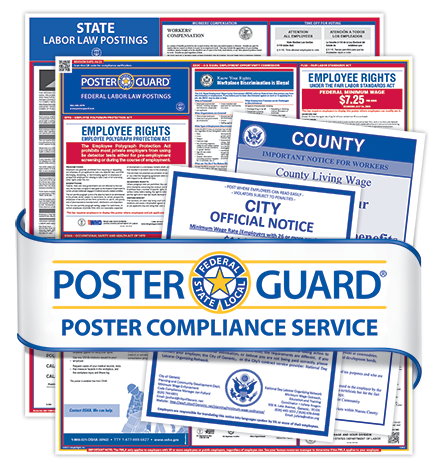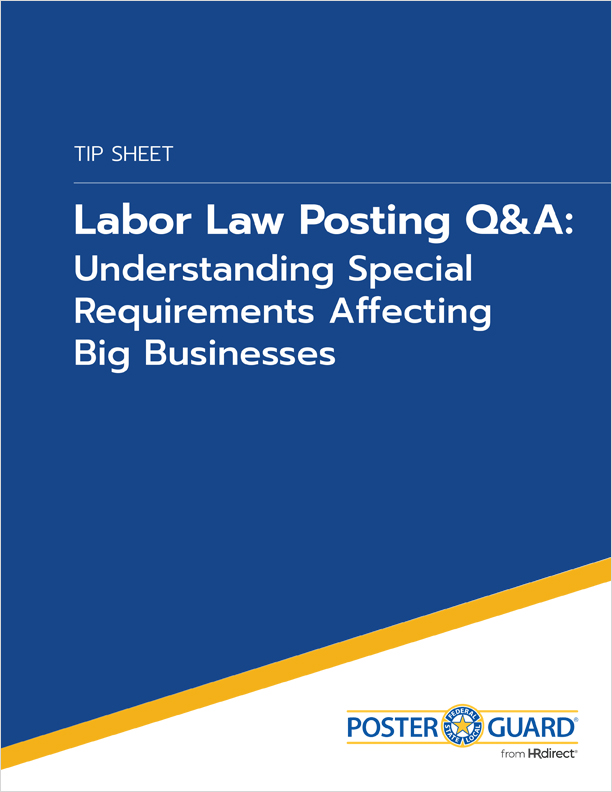One of the biggest issues for employers today is the emergence of state and local legislation expanding protections for pregnant employees. While pregnancy discrimination is already prohibited by federal law, new state and local maternity leave laws require employers to provide reasonable accommodations for pregnancy, childbirth and related medical conditions. Just as important, this legislation results in specific labor law postings and employee notifications.
Rise in State and Local Laws
This type of state and local legislation extends greater protections than what's already offered under the existing Pregnancy Discrimination Act (PDA). The PDA, an amendment to Title VII of the Civil Rights Act, is a federal law prohibiting discrimination on the basis of pregnancy, stating that pregnant women “shall be treated the same for all employment-related purposes.”
For example, in 2019, both Oregon and Kentucky passed new laws regarding pregnancy rights and accommodations. Oregon employers must provide reasonable accommodations to employees and job applicants who have limitations related to pregnancy, unless doing so would impose an undue hardship. This is now reflected in the Oregon Pregnancy Accommodations poster, in addition to a new employee handout.
Kentucky now requires companies to provide reasonable accommodations for pregnancy, childbirth and related conditions under the Pregnancy Workers Act. The legislation is covered in the revised Kentucky Equal Employment Opportunity Notice and involves a mandatory employee handout, as well.
In April 2020, Virginia also passed a law that requires employers with five or more employees to make reasonable accommodations for pregnancy, childbirth or similar conditions (including lactation), unless doing so would impose an undue hardship. In addition, employers cannot take adverse action against an individual for requesting accommodation, deny employment or promotion, or force the individual to take leave if the reasonable accommodation is available. A notice of these rights must be provided in an employee handbook, to new hires at the start of their employment and to pregnant employees within 10 days of them notifying the employer, as well through a posting in a conspicuous location.
As of May 2020, 29 states, the District of Columbia and four cities have passed legislation requiring employers to provide reasonable accommodations to pregnant workers.
Why Reasonable Accommodations for Pregnant Workers Matter
While the PDA helps shield pregnant women from discrimination in the workplace, it is limited in the types of practical protections it provides. For example, there are no clear guidelines in the Act regarding reasonable accommodations, so it’s not uncommon for employers to enter a legal gray area and overlook the specific needs of pregnant employees.
According to a study conducted by the National Partnership for Women & Families, nearly two-thirds of women between 18-45 who had given birth experienced these obstacles to working effectively and managing their health during their pregnancies:
- 71 percent needed more frequent breaks
- 61 percent needed adjustments to their schedule to get medical care
- 50 percent needed a change in duties, such as less heavy lifting or more chances to sit
- 40 percent needed some other type of workplace adjustment
Unfortunately, oversights like this can leave a company vulnerable to discrimination lawsuits. To protect your business from potential lawsuits, you should always be open to discussing reasonable accommodations with pregnant employees.
Unless they cause an undue hardship on your business, such accommodations may include:
- Frequent restroom and water-drinking breaks
- Rest breaks for jobs requiring long bouts of standing
- Assistance with manual labor, such as heavy lifting
- Modified work schedules or job restructuring
- Temporary job transfers if the job requires strenuous or hazardous work
- Leave for a disability resulting from childbirth
Protect Your Pregnant Employees and Satisfy Posting Compliance
As more states and cities pass specific legislation, employers can anticipate an increase in pregnancy-related protections and workplace accommodations. In addition, it’s critical to keep up with workplace posting and employee handout requirements, which are covered by Poster Guard® Compliance Protection (base service) and the Mandatory Employee Handout Service.



